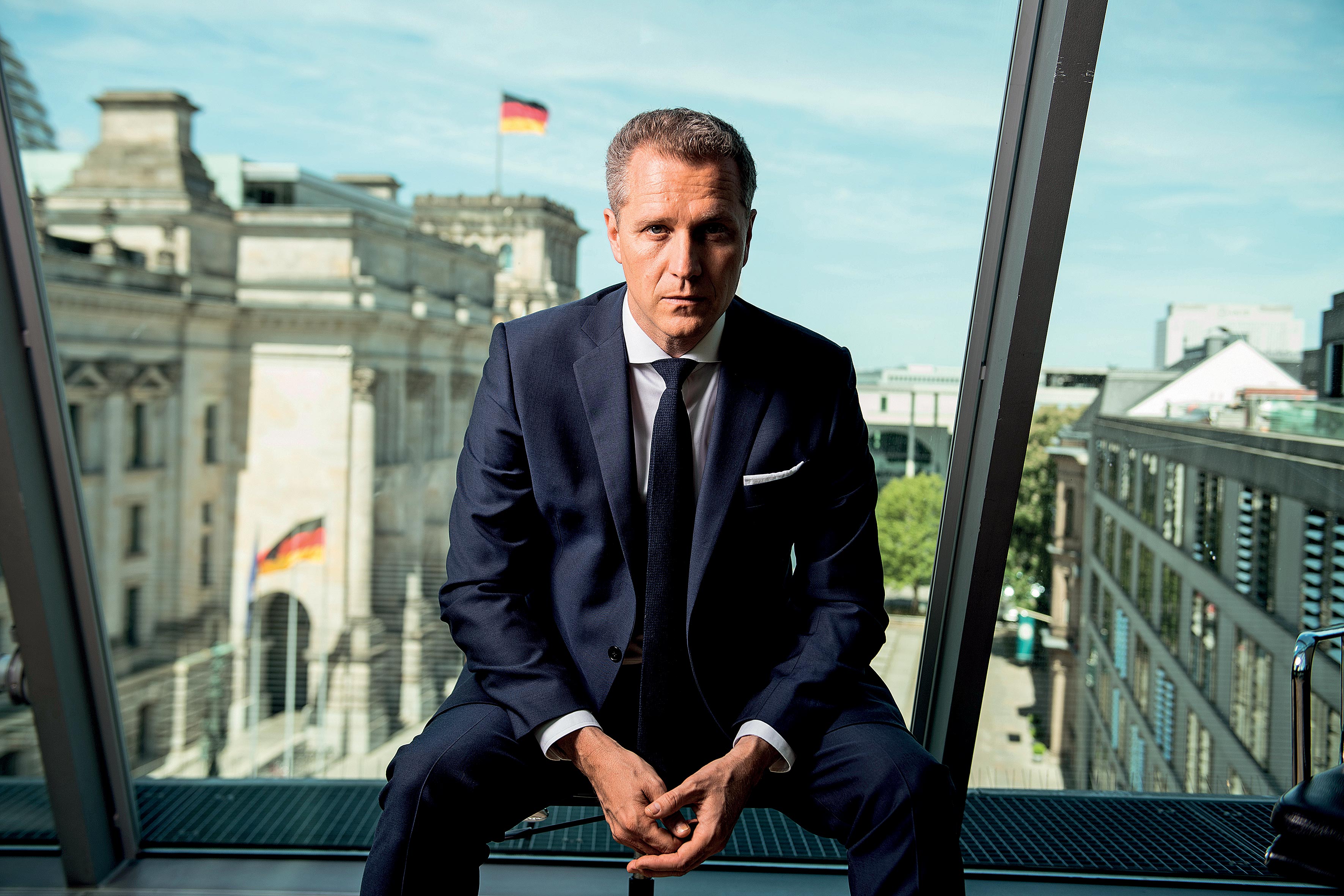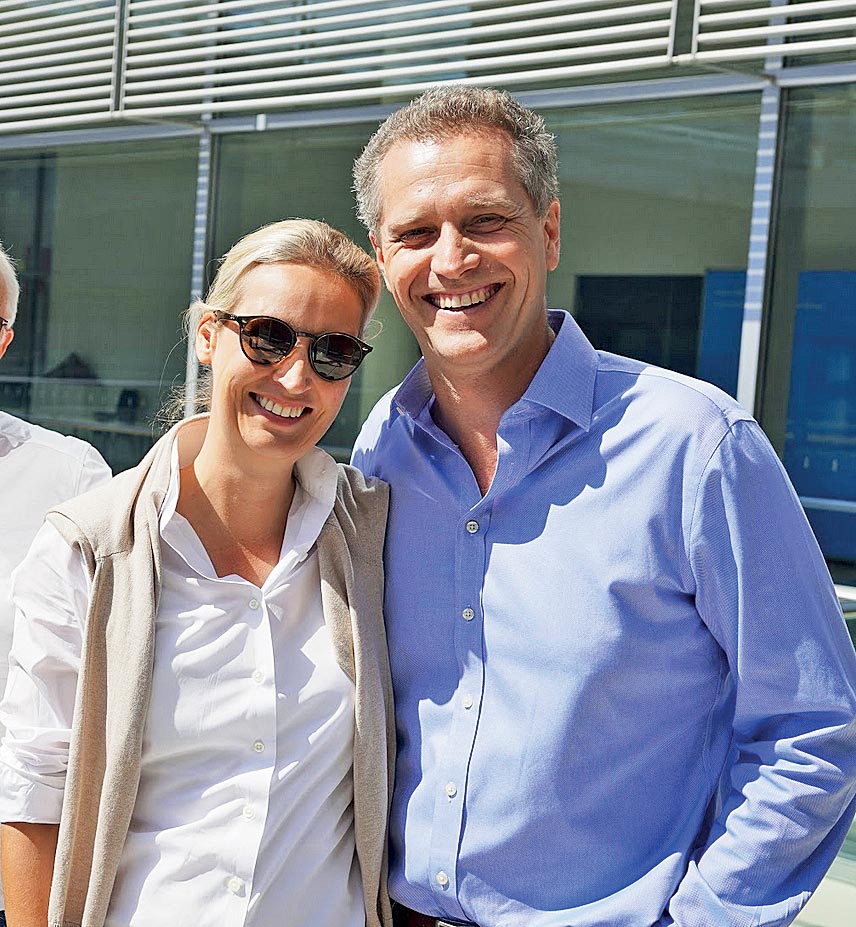At fifteen, he was still gallivanting around Czechia; thirty years later, he became a member of the German federal parliament. Plenty of people support his views while many more see them as an issue. Similar to the party that Petr Bystroň represents in the Bundestag, the Alternative for Germany (AfD).
You graduated from the Munich School of Politics and Public Policy, you are the chairman of the Bavarian AfD and a member of the German federal parliament for the second term now. Did you plan on becoming a full-time politician when you were studying?
Not at all. My friend and I started a business when we were 20. But I also wanted to have a college degree. I decided on political science solely because I thought it would be a breeze to get through if I just read the newspaper every day. It ended up being a bit more difficult than that. A lot of people who are now in high politics studied at the aforementioned university. Mainly from the conservative CSU – the party's former secretary general, members of the German federal parliament as well as the Federal Council. I was a member of the liberal FDP for seven years but I never planned to make a career out of politics. It came out of the blue when the Alternative for Germany was formed. In a matter of weeks, tens of thousands of people joined the newly-formed party in 2013, half of whom were never members of any political party before. We were all upset that politics just wasn't solving the issues we were having. So we decided to take matters into our own hands.
So you were drawn to politics...
I've always been a very political person ever since I was little. When we were thirteen, my friends and I started a Boy Scouts club in the then communist Czechoslovakia. It was our way of protesting against the communist Pioneer organization. And it caused a major problem, of course. Two years later, I was caught by the police while distributing cassette tapes with banned songs by Karel Kryl and Jarek Nohavica and got arrested. Both of those actions were motivated by a longing for liberty. I despise oppression of any kind.
Have you never considered coming back to Czechia after the revolution? Are you keeping an eye on the political situation here?
I am one of the so-called Husák's Children, and I naturally do keep an eye on things going on in Czechia and Slovakia both because half of my family comes from Slovakia. My wife is originally Czech, so we often go there for personal visits. And ever since I've become the chairman of the parliamentary group for Czechia, Slovakia, and Hungary, even for business trips.
What do you consider your biggest success in politics?
Retrospection is not something I particularly enjoy, but since you asked... I believe that being elected chairman of a conservative party in Bavaria as a first-generation immigrant and then being co-opted into the Bundestag two more times consecutively while also becoming a party's foreign policy spokesperson there is not a bad tally, right?
What is the mood like in German society right now?
Bad. And getting worse by the day. No wonder, seeing as the government is doing one thing after another against the will of the people. People are doing considerably worse, too. Inflation is growing, buying power shrinking, we are dealing with issues related to millions of migrants every day. Just look at how crime has grown or the pressure we have in the housing market. The same is reflected in statistical data – more than 200,000 hard-working, well-educated Germans leave the country every year. They go to the USA, Switzerland, Austria.
You've been an AfD member since the early days. It is often labeled as a right-wing populist party, or even as the far-right. How do you feel about such labels from "within" the party?
Right. Do you think that xenophobes and homophobes would elect that Czech Bystroň in a secret-ballot vote to be the Bavarian chairman or that lesbian Weidel to be the party's nationwide chair? We are a tough opposition that is taking more and more votes from the old parties. And they're fighting back. Seeing as our criticism of their faults racks up points for our side, they don't like to engage in factual discourse with us. Because that's where they lose. They prefer to slander us wherever and however they can. As the election results show, however, this strategy seems to no longer be working for them now after ten years. According to the latest polls, we are the second strongest party with more votes than any of the three individual ruling ones. We are the most successful new political party founded since World War II.
How do you explain the fact that your party is more popular in the former East Germany?
That is very simple. The people from that region have already been through a dictatorship and they don't want to have another one. They understand very well our criticism of the current trend of drastic oppression of people's personal freedoms and they are good at recognizing government propaganda. That's actually the reason why a lot of Poles, Czechs, and other immigrants with German citizenship vote for us as well.
Euroskepticism, national conservatism, and nationalism are ideologies that AfD's policy is based on. Where do you see Europe – and potentially the EU – heading in the coming years as a Euroskeptic?
I wouldn't say nationalism, but rather healthy patriotism, which means love for one's homeland. I feel that it should serve as the fundament for all negotiations between countries, even on the EU level. We Europeans have a lot to be proud of, no matter if we're Czech, German, French, or Polish. Our continent was the cradle of philosophy, science, art, and we have an excellent tradition of Roman law. We gave the world not just Christianity but also the ideology of enlightenment and freedom of the individual. Those are the values that the EU should be based on. And every EU country has politicians who embody these values – Václav Klaus, Marine Lepenn, Nigel Farage, Viktor Orbán, and others. I wrote a book about this. It's called "Make Europe Great Again". That is our joint political program.
How do you feel about the controversial statements connected to some AfD representatives, such as former co-chair Frauke Petry's mention of shooting on the border, or Björn Höcke's comment about the Berlin Holocaust Memorial?
The statements were not controversial in and of themselves. Frauke Petry merely said that the border guard should protect the border as stipulated by law. She said, word for word, "I don't want it, the border guard doesn't want it, but if there's no other way, they have to use their weapon as prescribed by the law." The media then turned it into the headline "Frauke Petry Wants to Shoot at Refugees." And it was quite similar with Höcke. But we're coming back to intentional slander again. The nice thing is that it no longer works. Many people have seen through these lies in recent years, during which we were the only party that fought for the people's freedoms against measures taken during the covid crisis that were often unconstitutional. We now have voters from the ranks of the greens and the communists because they understood that the political spectrum is no longer separated into the left and the right, but rather into the globalists and the populists. We are the only ones who still do it for the populus, meaning the people. And that's why more than 21 percent of the people want to vote for us. One number is even more important than that: nearly 50 percent of Germans could see themselves voting for us one day. That's a decent outlook, no?
CV BOX
Petr Bystroň (born November 30, 1972, in Olomouc) is the foreign policy spokesperson for the Alternative für Deutschland (Alternative for Germany) party in the Bundestag and the party's Bavarian chairman since 2015. He also chairs the German parliamentary group for Czechia, Slovakia, and Hungary, and is a member of the Council of Europe in Strasbourg.
He emigrated from the Czechoslovakia to Germany in 1987 when he was 16 years old. He graduated in economics and international relations from the Munich School of Politics and Ludwig-Maximilian-Universität. During his studies, he founded an advertising firm with international reach, which he successfully sold to a stock company ten years later.
He was a member of the FDP for seven years, and since 2013, has been a member – and in recent years also a prominent representative – of the Alternative für Deutschland party.
Besides politics, he works as a business strategy advisor.
He has authored various publications, including the books "25 Years after the Wall" published by Geneva University, and "MEGA - Make Europe Great Again".
Bystroň is married to a diplomat of Czech descent, has two children, and alternates living in Berlin and Munich.


With AfD co-chair Alice Weidel